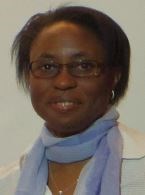'Meet the Editor': Yemisi Takwoingi
Monday, 06 Mar 2017 In this ninth instalment of the CIDG 'Meet the Editor' series, we meet Yemisi Takwoingi.
In this ninth instalment of the CIDG 'Meet the Editor' series, we meet Yemisi Takwoingi.
Could you describe where you currently work and what you do there?
I am currently a Senior Research Fellow in Biostatistics in the Test Evaluation Research Group (TERG) based within the Institute of Applied Health Research at the University of Birmingham, UK. My main research interest is in methods for systematic reviews of diagnostic test accuracy (DTA) studies, and the design and conduct of primary studies of medical tests. I provide statistical input/lead on various collaborations undertaking systematic reviews and primary studies of tests in a variety of healthcare topics. I also teach statistics to undergraduate medical and maths students, and Master’s level Public Health and Health Technology Assessment students. TERG organises methodological peer review and editorial approval for the publication of Cochrane DTA protocols and reviews and I contribute to this activity.
What is a typical day for you?
I don’t think I have a typical day, which is one of the reasons I love my job. My day may be focused on methodological research; preparing teaching materials or teaching; performing meta-analyses or advising on some aspect of a systematic review or design of a diagnostic accuracy study; or a combination of any of these. I have worked in various clinical fields including malaria, TB, foetal aneuploidies and growth problems, dementia, skin cancer, etc. As such I constantly switch my thought process between specialities. This is a challenge but one I enjoy very much. This reminds me of a quote by the American mathematician John Tukey “The best thing about being a statistician is that you get to play in everyone's backyard.”
What prompted you to work in this area?
I became interested in evidence synthesis during my Masters in Medical Statistics and having had personal experience of the impact of a systematic review, I’ve been hooked ever since. I like a challenge and was intrigued by the complexity of diagnostic research. Consequently, I decided to combine my interest in diagnostic research and evidence synthesis. After all, “without diagnosis, medicine is blind” (Alain Mérieux).
What are the major challenges that still remain in your field?
Methods for systematic reviews of diagnostic accuracy have evolved but still lag behind those of intervention reviews. There are challenges in every aspect of the DTA systematic review process but one of the major challenges is making the methods more accessible to reviewers. To address this issue, members of the Cochrane Screening and Diagnostic Tests Methods Group have been developing online learning modules, and software programs and tutorials.
How did you first hear about Cochrane?
My MSc dissertation was on prioritization strategies for updating systematic reviews and I used a cohort of Cochrane reviews for the research. This is probably when I first heard about Cochrane.
What is the most rewarding aspect of being involved with Cochrane?
Good friendships and working with people who share the same passion for developing robust methods and producing high quality evidence.
Who (or what) has been the biggest influence on your career to date?
Professor Jon Deeks and Professor Alex Sutton have been big influences in the past 10 years. Alex’s passion for meta-analysis fuelled my interest in the subject, and Jon’s encouragement inspired me to take on opportunities that have shaped my career in test evaluation.
Please list three words you would associate with Cochrane.
People, commitment, transparency.
What do you do in your spare time?
Spare time tends to be taken up by my younger daughter who is a keen athlete. I spend time in muddy fields during the cross country season in the winter, and at athletics stadiums during the spring and summer. I often support her athletics club by volunteering as an unqualified official at league competitions. I’ve enjoyed this so much so I’m planning on doing a course to become a qualified official. When I eventually get some more spare time, I’d like to take up sugar craft again as I used to enjoy cake decorating and making sugar flowers.
The CIDG editorial base is located at the Liverpool School of Tropical Medicine in Liverpool, UK. The CIDG is led by Professor Paul Garner (Co-ordinating Editor) and Anne-Marie Stephani (Managing Editor). Over 600 authors from some 52 countries contribute to the preparation of the Cochrane Reviews. They are supported by an international team of Editors, each with topic or methodological expertise.
The CIDG’s main areas of work are on determination of the effects of interventions on the prevention or treatment infectious diseases of relevance to the United Nations Sustainable Development Goals, particularly malaria, tuberculosis, HIV/AIDS, and neglected tropical diseases. The aims of the CIDG are to impact on policy and research in tropical diseases through the production of high quality and relevant systematic reviews, and to lead developments in review quality improvement and effective dissemination of findings.
